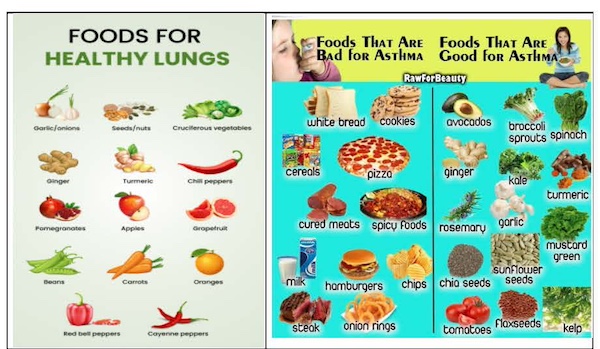Contribute
| Asthma And Diet: Foods That May Help Or Harm Lung Health |
Dr. Indrajeet Tyagi and Dr. Iranna Hirapur
11/23/2025
Asthma affects more than 300 million people worldwide and continues to rise, especially among children and young adults. While medication remains the cornerstone of asthma management, an expanding field of research suggests that what we eat may also influence how well we breathe. Diet alone cannot prevent or cure asthma, but certain foods may help control inflammation and symptoms—while others have the potential to make breathing more difficult. Describe Foods that have anti-inflammatory advantage A diet rich in fruits, vegetables, and whole foods appears to support healthier lungs. Colorful produce such as apples, berries, leafy greens, and tomatoes supply high levels of antioxidants that help neutralize oxidative stress — a key driver of airway inflammation in asthma. Spices like turmeric and ginger also possess natural anti-inflammatory properties. A diet rich in the following can be beneficial: Food Group Sources Potential Benefit Fruits and Vegetables Apples, oranges, berries, broccoli, leafy greens (spinach, kale), sweet potatoes, carrots, tomatoes Rich in antioxidants (vitamins C and E, beta-carotene, flavonoids) that reduce inflammation and irritation in the airways caused by free radicals. Omega-3 Fatty Acids Fatty fish (salmon, sardines, tuna), walnuts, flaxseeds Help lower inflammation in the body and protect the respiratory system. Studies suggest omega-3s can help reduce airway swelling and improve lung function, although results vary from person to person. Vitamin D Fatty fish, fortified beverages (milk and orange juice), eggs and mushrooms sunlight exposure Boosts immune system response and can reduce airway swelling and fewer asthma flare-ups whereas low levels are linked to an increased risk of asthma attacks. Fiber Whole grains (oats, brown rice, whole wheat pasta), beans, fruits, vegetables Promotes a healthy gut microbiome, which plays a role in immune responses and can improve lung function. Research shows may have a profound “gut-lung connection” with the immune system. By reducing inflammation throughout the body, fiber-dense foods may indirectly ease asthma symptoms. Magnesium /Selenium Nuts (almonds, hazelnuts), seeds, spinach, fish and legumes May help relax bronchial muscles and supporting easier airflow Explain Asthma Triggers on the Plate Just as some foods may help reduce symptoms, others can worsen them depending on the individual. Highly processed foods, sugary snacks, and fast-food meals are associated with stronger inflammatory responses in the airways. Saturated fats from fried foods and certain dairy and meat products may also impair lung function in some individuals. Sulfites: These preservatives used in packaged fruit juices, bottled lemon or lime juice, dried fruit, pickled foods, and some fresh/frozen shrimp and some wines such as red wine, beer. People with sulfite-sensitive asthma can experience coughing, wheezing, or even full-scale attacks after consumption. Common Allergens: Food allergies play a critical role in asthma management. Milk, eggs, nuts, shellfish, and wheat are among the most common triggers for allergy-related asthma symptoms. Food allergies can worsen asthma symptoms. In these cases, strict avoidance is essential to prevent respiratory reactions. Processed and High-Fat Foods: Processed meats like hot dogs, bacon, saturated fats (red meat, some desserts), and sugar-sweetened beverages is linked to increased inflammation and a higher risk of developing or worsening asthma. Some of these contain nitrites that can irritate the airways in sensitive people, while artificial dyes and additives may also provoke reactions for a subset of individuals. Foods that cause gas/bloating: For some, the pressure from a bloated belly can make breathing more difficult and potentially trigger an attack. Such foods include beans, carbonated drinks, fried foods, garlic, and onions. Salicylates: Naturally occurring Salicylates (chemical compounds) in items like coffee, tea, and certain herbs/spices can make breathing harder for a small number of people. How hydration and weight Balance help in Asthma management? Good hydration assists the lungs in clearing mucus more effectively. Additionally, maintaining a healthy weight reduces pressure on the chest and diaphragm, allowing for easier breathing and improved exercise tolerance. Being overweight or obese can put extra strain on the lungs and worsen asthma control. Maintaining a healthy weight through diet and exercise is crucial for management. It is important to recognize that every person with asthma may respond differently to certain foods. Experts often recommend keeping a symptom diary to track how meals align with breathing patterns. At the same time, healthcare professionals emphasize that nutrition should be considered supportive care — not a replacement for prescribed inhalers or medical treatments. Collaboration with doctors and dietitians can guide safer choices.
by Dr. Indrajeet Tyagi and Dr. Iranna Hirapur
You may also access this article through our web-site http://www.lokvani.com/
